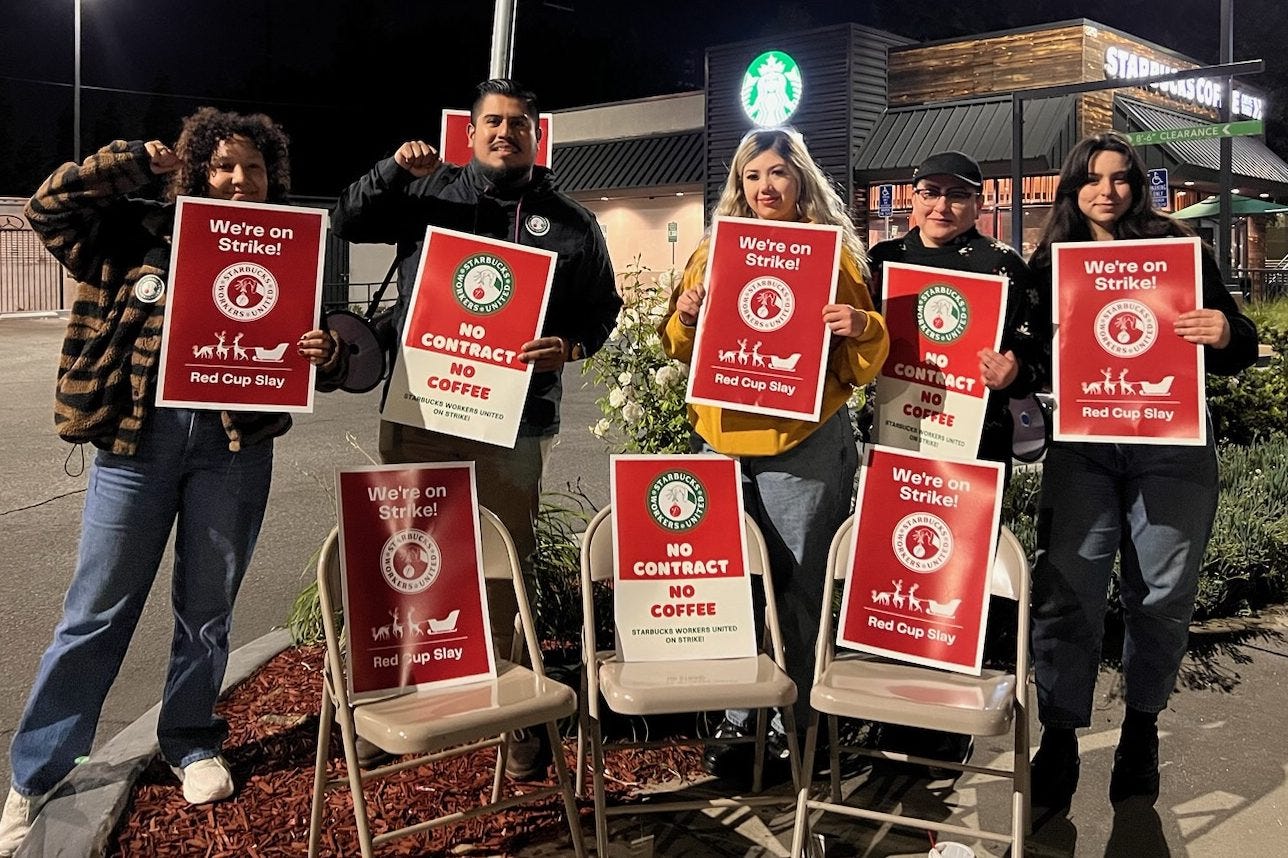09/03/2025: More Starbucks Discrimination Against Union Postings
Also an application of the single-facility presumption.
Starbucks Corporation, JD-73-25, 14-CA-321382 (ALJ Decision)
In this case, Administrative Law Judge Christine Dibble ruled that Starbucks violated the National Labor Relations Act at its Affton, Missouri store during a 2023 unionization campaign. The violations included:
Prohibiting employees from posting pro-union materials in the back-of-house area while allowing other non-work-related postings
Disparately enforcing its solicitation/distribution policy against union supporters
The judge found that District Manager Megan Daly and Store Manager Cesar King selectively removed "We're Voting Yes!" union flyers while permitting personal notices and anti-union materials to remain posted. Evidence showed management frequently visited the area where these materials were posted but only removed pro-union content.
The judge dismissed a third allegation that management threatened employees with discipline for union activities, finding insufficient evidence to support this claim.
Judge Dibble ordered Starbucks to cease its discriminatory enforcement of posting policies and post notices at the store for 60 days.
Significant Cases Cited
Benteler Industries, 323 NLRB 712 (1997): Employer violated the Act by refusing to post union literature while permitting other non-work notices.
Brockton Hospital, 333 NLRB 1367 (2001): Employees' Section 7 rights outweighed employer's property interests in non-patient care areas.
Eastex, Inc. v. NLRB, 98 S.Ct. 2505 (1978): Established balancing test for employer property rights against employees' Section 7 rights.
Jefferson Chemical Co., Inc., 200 NLRB 992 (1972): Serial litigation requires same parties, same charge, and same facts - conditions not present in this case.
Saint Vincent's Hospital, 265 NLRB 38 (1982): Prohibiting distribution of union information while permitting personal solicitations violated the Act.
Touchstone Climbing, Inc., 20-RC-369707 (Regional Election Decision)
This NLRB decision addresses whether four single-facility units at Touchstone Climbing gyms are each appropriate for collective bargaining, or whether only a multi-facility unit of all nine Bay Area locations would be appropriate. The Regional Director found in favor of four separate single-facility bargaining units.
The case involved petitions by Western States Regional Joint Board, Workers United to represent employees at four Touchstone Climbing gyms: Mission Cliffs and Dogpatch Boulders in San Francisco, The Studio in San Jose, and Diablo Rock in Concord. The employer argued that only a Bay Area-wide unit of all nine facilities would be appropriate.
The Regional Director applied the single-facility presumption, which holds that a petitioned-for single-facility unit is presumptively appropriate unless the party proposing a multi-facility unit can show the single facility has been "so effectively merged or is so functionally integrated that it has lost its separate identity."
The decision analyzed six key factors:
Centralized Control/Local Autonomy: While the employer had centralized policies, each facility had significant local autonomy through facility managers who handled hiring, discipline, scheduling, and daily operations.
Employee Skills and Working Conditions: Employees shared similar skills and working conditions across facilities, which weighed in favor of a multi-facility unit.
Functional Integration: The evidence failed to show significant functional integration between facilities. Each facility operated independently with only occasional support between locations.
Employee Interchange: The record showed limited permanent transfers and temporary interchange between facilities. Most interchange was voluntary and represented a small percentage of total hours worked.
Geographic Distance: The facilities were spread across five California counties with varying distances between them (2.5 to 50 miles), with Bay Area traffic often increasing travel time.
Bargaining History: There was no bargaining history for the facilities, making this a neutral factor.
The Regional Director concluded that the presumption of single-facility units had not been rebutted and directed elections at each of the four facilities. The similarity of employee skills and centralized policies was outweighed by significant local autonomy, limited interchange, and lack of functional integration.
Significant Cases Cited
Audio Visual Services Group, LLC, 370 NLRB No. 39 (2020): Established factors for determining whether the single-facility presumption has been rebutted.
Laboratory Corporation of America Holdings, 341 NLRB 1079 (2004): Outlined the factors for analyzing appropriate bargaining unit determinations.
Budget Rent A Car Systems, 337 NLRB 884 (2002): Addressed when functional integration and centralized labor policies may support a multi-location determination.
Hilander Foods, 348 NLRB 1200 (2006): Found that centralized control was outweighed by local autonomy over day-to-day working conditions.
New Britain Transportation Co., 330 NLRB 397 (1999): Established that a significant portion of the workforce must be involved in interchange to meet the burden of proof.

